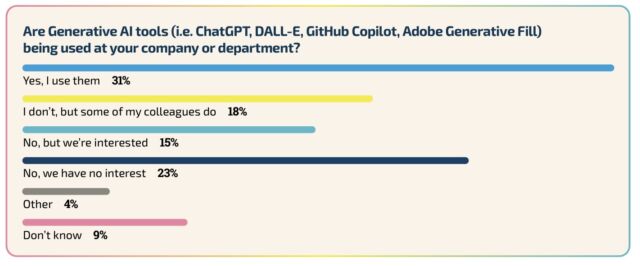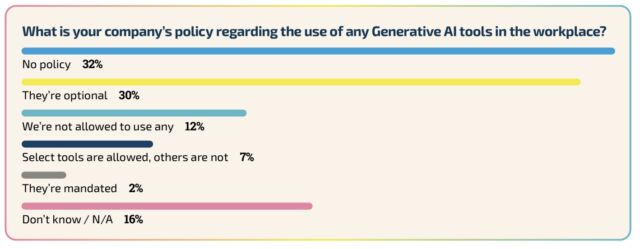
A new survey of thousands of game development professionals finds a near-majority saying generative AI tools are already in use at their workplace. But a significant minority of developers say their company has no interest in generative AI tools or has outright banned their use.
The Game Developers Conference’s 2024 State of the Industry report, released Thursday, aggregates the thoughts of over 3,000 industry professionals as of last October. While the annual survey (conducted in conjunction with research partner Omdia) has been running for 12 years, this is the first time respondents were asked directly about their use of generative AI tools such as ChatGPT, DALL-E, GitHub Copilot, and Adobe Generative Fill.
Forty-nine percent of the survey’s developer respondents said that generative AI tools are currently being used in their workplace. That near-majority includes 31 percent (of all respondents) that say they use those tools themselves and 18 percent that say their colleagues do.

The survey also found that different studio departments showed different levels of willingness to embrace AI tools. Forty-four percent of employees in business and finance said they were using AI tools, for instance, compared to just 16 percent in visual arts and 13 percent in “narrative/writing.”
Among the 38 percent of respondents who said their company didn’t use AI tools, 15 percent said their company was “interested” in pursuing them, while 23 percent said they had “no interest.” In a separate question, 12 percent of respondents said their company didn’t allow the use of AI tools at all, a number that went up to 21 percent for respondents working at the largest “AAA developers.” An additional 7 percent said the use of some specific AI tools was not allowed, while 30 percent said AI tool use was “optional” at their company.
Worries abound
The wide embrace of AI tools hasn’t seemed to lessen worries about their use among developers, though. A full 42 percent of respondents said they were “very concerned” about the ethics of using generative AI in game development, with an additional 42 percent being “somewhat concerned.” Only 12 percent said they were “not concerned at all” about those usage ethics.

Overall, respondents offered a split opinion on whether the use of AI tools would be overall positive (21 percent) or negative (18 percent) for the industry. Most respondents seemed split, with 57 percent saying the impact would be “mixed.”
Developers cited coding assistance, content creation efficiency, and the automation of repetitive tasks as the primary uses for AI tools, according to the report.
“I’d like to see AI tools that help with the current workflows and empower individual artists with their own work,” one anonymous respondent wrote. “What I don’t want to see is a conglomerate of artists being enveloped in an AI that just does 99% of the work a creative is supposed to do.”
Elsewhere in the report, the survey found that only 17 percent of developers were at least somewhat interested in using blockchain technology in their upcoming projects, down significantly from 27 percent in 2022. An overwhelming 77 percent of respondents said they had no interest in blockchain technology, similar to recent years.
The survey also found that 57 percent of respondents thought that workers in the game industry should unionize, up from 53 percent last year. Despite this, only 23 percent said they were either in a union or had discussed unionization at their workplace.




